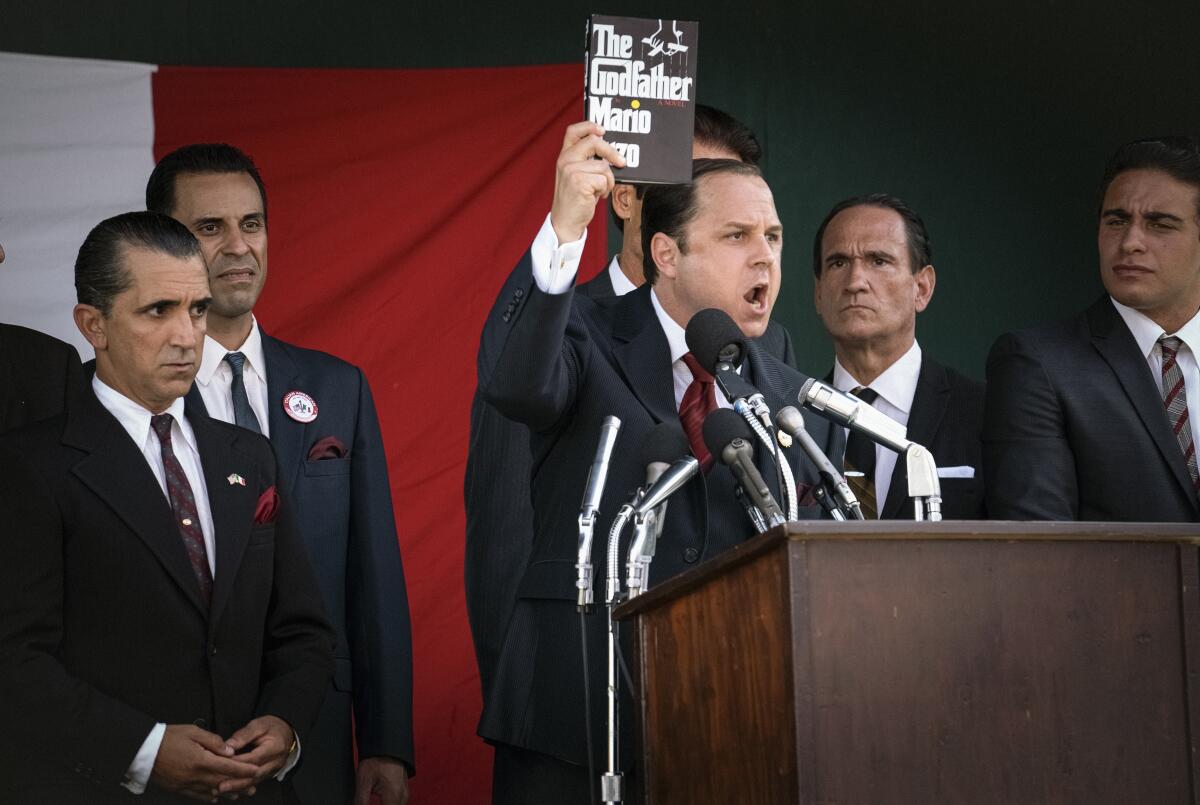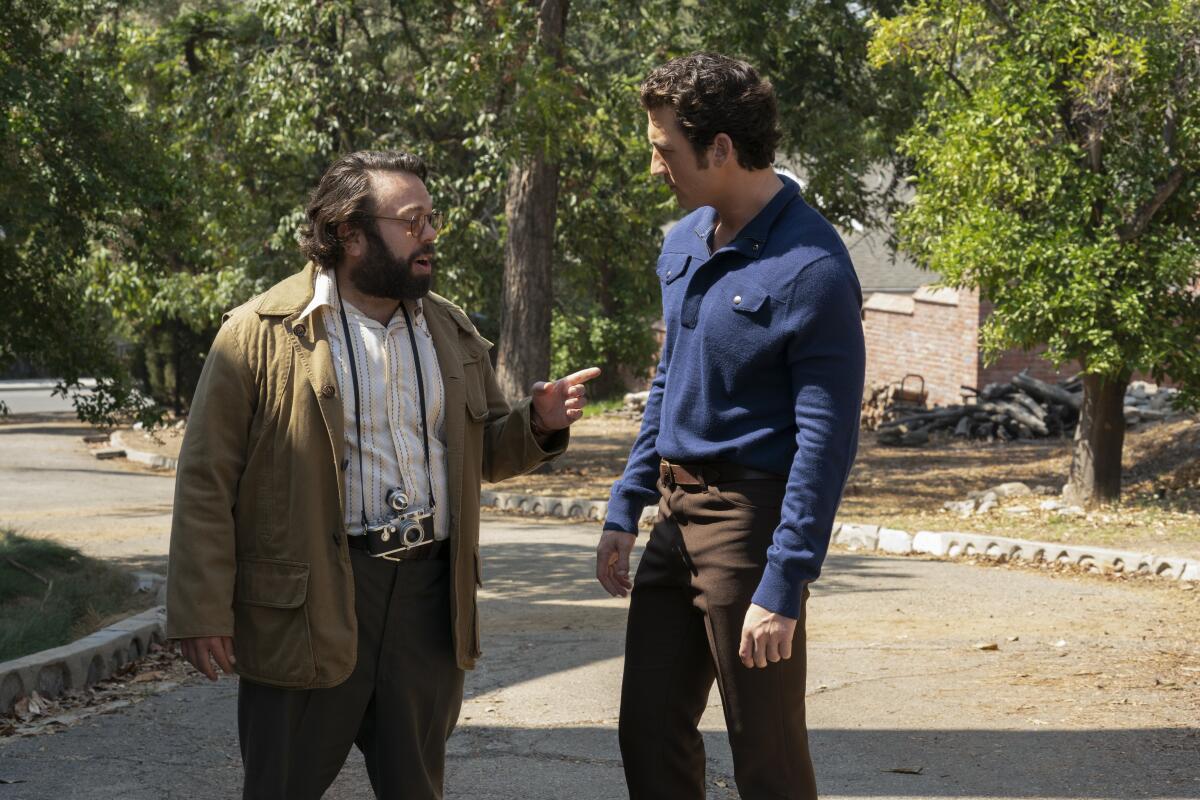A new show about ‘The Godfather’ is full of embellishments. The truth is dramatic enough

- Share via
Francis Ford Coppola was almost fired. Paramount execs didn’t want Brando and thought even less of Al Pacino. That severed horse head in the studio mogul’s bed? It was real. And the actor, John Marley, had to spend an entire day in a pool of prop blood filming the scene.
But you’re probably aware of all these things because, 50 years after its release, most people know “The Godfather” and the Corleone family more intimately than they know their own ancestries. Or maybe that’s just me. I once floated “Santino” as a name for the new family dog, but my wife objected, saying she didn’t think it wise to name a household pet for a hot-tempered mobster. (Sonny was impulsive, yes. But loyal too. That shouldn’t be forgotten.)

Clearly though there’s still an appetite for all things “Godfather” (and I’m not just talking about Clemenza’s recipe for meatballs and sausage with tomato sauce) as a 50th anniversary release of Coppola’s movie led the box office in per-screen average just a couple of months ago.
And now here to feed that hunger is “The Offer,” a 10-part limited series premiering Thursday on (where else?) Paramount+ that leans into the movie’s mythology in ways that are sometimes entertaining, too often ridiculous and, on occasion, quite possibly libelous, though I’d have to consult the family consigliere on that count because it’s outside my area of expertise.
The complete guide to home viewing
Get Screen Gab for everything about the TV shows and streaming movies everyone’s talking about.
You may occasionally receive promotional content from the Los Angeles Times.
The series is based on producer Albert S. Ruddy’s experience of making “The Godfather,” a point worth mentioning as, from the start, there have been wildly conflicting accounts about who deserves the credit for the film’s phenomenal success. “The Offer” makes a case for a combination of Ruddy (Miles Teller), Coppola (Dan Fogler) and Paramount’s head of production Robert Evans (Matthew Goode), with a strong assist from Ruddy’s secretary Bettye McCartt (Juno Temple) and, with a tiny mention in the finale, Paramount executive Peter Bart (Josh Zuckerman), who did, after all, option Mario Puzo’s unfinished novel and suggested Coppola direct.
Those names will ring familiar to anyone steeped in “Godfather” lore, save for McCartt, who, prior to this series, I had known solely for her role in procuring the horse head after Coppola deemed the taxidermy prop insufficiently authentic. As Temple quickly emerges as the series’ most engaging actor, McCartt’s expanded presence is welcomed, even if it’s fictionalized. Her prominence is also likely a concession to critics like Molly Haskell who wrote, on the film’s 25th anniversary, that the movie “demeans and demotes women outrageously.” The story was titled: “World of ‘The Godfather’: No Place for Women.”
Or as Meg Ryan put it in Nora Ephron’s “You’ve Got Mail”: “What is it with men and ‘The Godfather’?”
Ryan’s character would have enjoyed “The Offer” just for Temple, playing a woman who asserts that she doesn’t want “to get trapped in this little box the men of this world have given me.”

What does this have to do with the making of “The Godfather”? Nothing, really, as is the case with much of this bloated limited series, which spends a fair amount of time in its final episode detailing Ruddy’s efforts to produce … “The Longest Yard,” starring Burt Reynolds. That might not be what you were expecting when you began this nine-hour journey, and it’s likely many viewers won’t make it that far.
“The Offer” also trades heavily on “The Godfather’s” intersection with real-life mobsters, devoting a good chunk of its running time to Ruddy’s attempts to appease mobster Joe Colombo (Giovanni Ribisi), who hated Puzo’s novel and wanted to shut the movie down from filming on location in New York. Ruddy got close to Colombo — too close. Charlie Bluhdron, chairman of Paramount’s parent company, Gulf & Western, fired him after a picture of Ruddy and Colombo at a news conference landed on the front page of the New York Times. But the mob had blessed the movie via Ruddy. Without him, it couldn’t be made. Bluhdron quickly rehired him.
The broad strokes of all this is true. But “The Offer,” written by Michael Tolkin, best known for his cynical look at Hollywood in the sublime “The Player,” isn’t content to offer this remarkable story without needless embellishments. So, in addition to Colombo, we get another gangster, “Crazy” Joe Gallo, presented in a wildly inaccurate timeline and depiction that will befuddle anyone who has seen “The Irishman” or heard the 1975 Bob Dylan song, “Joey,” which, like “The Offer,” is too long by half and romanticizes its subject. Some have leveled that criticism against “The Godfather” too, but Coppola wanted his movie to be a metaphor about the corrosiveness of unrestrained capitalism.
Brando bought into the idea. “The Mafia is so American!” he said. A key to the story for the actor was the line “It’s not personal. It’s strictly business.” To Brando, that summed up America’s involvement in the Vietnam War.
The Annotated Godfather The Complete Screenplay Jenny M. Jones Black Dog & Leventhal: 264 pp., $29.95
Evans thought Coppola was nuts. But then, “The Offer” also idealizes Evans, who did a pretty good job of that himself in his memoir and subsequent documentary “The Kid Stays in the Picture.” Evans took a lot of credit for shaping “The Godfather” after it finished shooting, telling Coppola to restore footage he cut. (“You shot a saga and turned in a trailer. Now give me a movie!”) Coppola countered that he turned in a shorter version at the studio’s behest and, subsequently, simply restored the scenes Evans had ordered to be removed.
“You did nothing on ‘The Godfather’ but annoy me and slow it down,” Coppola wrote to Evans in a heated telegram years after the movie had been released. “That is why Charlie [Bluhdorn] put in the ‘Godfather II’ contract that you could have nothing to do with the movie.”
But time has a way of easing lingering bitterness. During a 50th anniversary tribute at this year’s Oscars, Coppola, flanked by Pacino and Robert De Niro, singled out two collaborators: Puzo, who he has lauded many times, and “another who I’ve never thanked … but the time is due that I do.” And he saluted Evans.
It was a moment that felt more sincere than anything contained in “The Offer.”
More to Read
The complete guide to home viewing
Get Screen Gab for everything about the TV shows and streaming movies everyone’s talking about.
You may occasionally receive promotional content from the Los Angeles Times.







